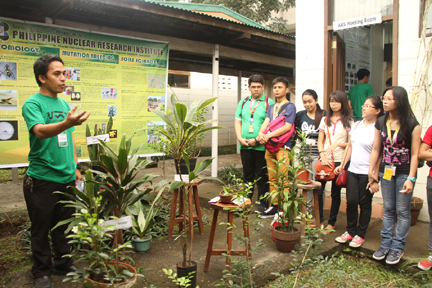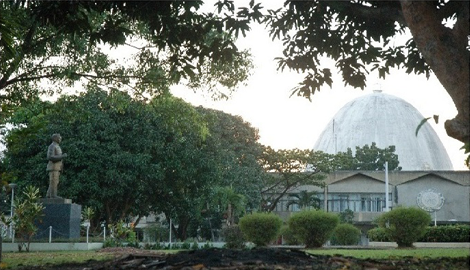PNRI Hosts 2013 Philippine Nuclear Science Quiz
- Details
As part of the 41st Atomic Energy Week celebration, the Philippine Nuclear Research Institute-Department of Science and Technology (PNRI-DOST) invites students from public and private secondary schools across the country to join the 2013 Philippine Nuclear Science Quiz.
The competition will cover various topics regarding nuclear science and technology such as radiation and radioactivity, atomic/nuclear structure, radiation protection, nuclear regulations and other related topics.
Two students will form a team to represent their respective schools at the eliminations to be held on November 26 at the PNRI compound in Commonwealth Avenue, Quezon City.
The first round consists of a 50-item multiple choice examination; the top 25 teams during the hour-long eliminations will advance into the semi-finals on December 12, during the Atomic Energy Week held at PNRI.
PNRI Celebrates 41st Atomic Energy Week
- Details

Students, teachers, members of the media, representatives from the medical sector and the public attended the various technical sessions and visited the open-house exhibits and facilities of the Philippine Nuclear Research Institute – Department of Science and Technology during the 41st Atomic Energy Week celebration from December 9 to 13 at the PNRI Compound along Commonwealth Avenue, Diliman, Quezon City.
The guiding theme for the AEW celebration this year was Nuclear Science, Safety and Security: Road to Smarter Philippines.
PNRI – DOST Features Advances in Nuclear Science and Technology in 41st Atomic Energy Week Celebration
- Details

The Philippine Nuclear Research Institute-Department of Science and Technology (PNRI-DOST) will feature the latest advances in nuclear science and technology in the fields of agriculture, industry, medicine and the environment during its 41st Atomic Energy Week celebration on December 9 to 13, 2013 at the PNRI compound in Commonwealth, Diliman, Quezon City.
As mandated under Presidential Proclamation No. 1211 in 1973, the annual AEW is celebrated every second week of December to help generate awareness of the Filipinos on the beneficial uses of nuclear science and technology.
PNRI opens its research facilities to the public on the 41st Atomic Energy Week
- Details
The Philippine Nuclear Research Institute-Department of Science and Technology (PNRI-DOST) will open its nuclear research facilities to the public during the 41st Atomic Energy Week (AEW) celebration on December 9-13, 2013 at the PNRI compound along Commonwealth Avenue in Diliman, Quezon City.
This year’s AEW celebration will focus on theme, “Nuclear Science, Safety and Security: Road to Smarter Philippines".
Read more: PNRI opens its research facilities to the public on the 41st Atomic Energy Week












































